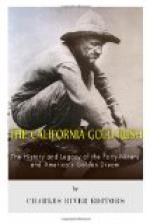There is an instance of a priest from Santa Clara, sued before the alcalde of San Jose for a breach of contract. His plea was that as a churchman he was not amenable to civil law. The American decided that, while he could not tell what peculiar privileges a clergyman enjoyed as a priest, it was quite evident that when he departed from his religious calling and entered into a secular bargain with a citizen he placed himself on the same footing as the citizen, and should be required like anybody else to comply with his agreement. This principle, which was good sense, has since become good law.
The alcalde refused to be bound by trivial concerns. A Mexican was accused of stealing a pair of leggings. He was convicted and fined three ounces for stealing, while the prosecuting witness was also fined one ounce for bothering the court with such a complaint. On another occasion the defendant, on being fined, was found to be totally insolvent. The alcalde thereupon ordered the plaintiff to pay the fine and costs for the reason that the court could not be expected to sit without remuneration. Though this naive system worked out well enough in the new and primitive community, nevertheless thinking men realized that it could be for a short time only.
As long as the war with Mexico continued, naturally California was under military Governors, but on the declaration of peace military government automatically ceased. Unfortunately, owing to strong controversies as to slavery or non-slavery, Congress passed no law organizing California as a territory; and the status of the newly-acquired possession was far from clear. The people held that, in the absence of congressional action, they had the right to provide for their own government. On the other hand, General Riley contended that the laws of California obtained until supplanted by act of Congress. He was under instructions as Governor to enforce this view, which was, indeed, sustained by judicial precedents. But for precedents the inhabitants cared little. They resolved to call a constitutional convention. After considerable negotiation and thought, Governor Riley resolved to accede to the wishes of the people. An election of delegates was called and the constitutional convention met at Monterey, September 1, 1849.
Parenthetically it is to be noticed that this event took place a considerable time after the first discovery of gold. It can in no sense be considered as a sequel to that fact. The numbers from the gold rush came in later. The constitutional convention was composed mainly of men who had previous interests in the country. They were representative of the time and place. The oldest delegate was fifty-three years and the youngest twenty-five years old. Fourteen were lawyers, fourteen were farmers, nine were merchants, five were soldiers, two were printers, one was a doctor, and one described himself as “a gentleman of elegant leisure.”




